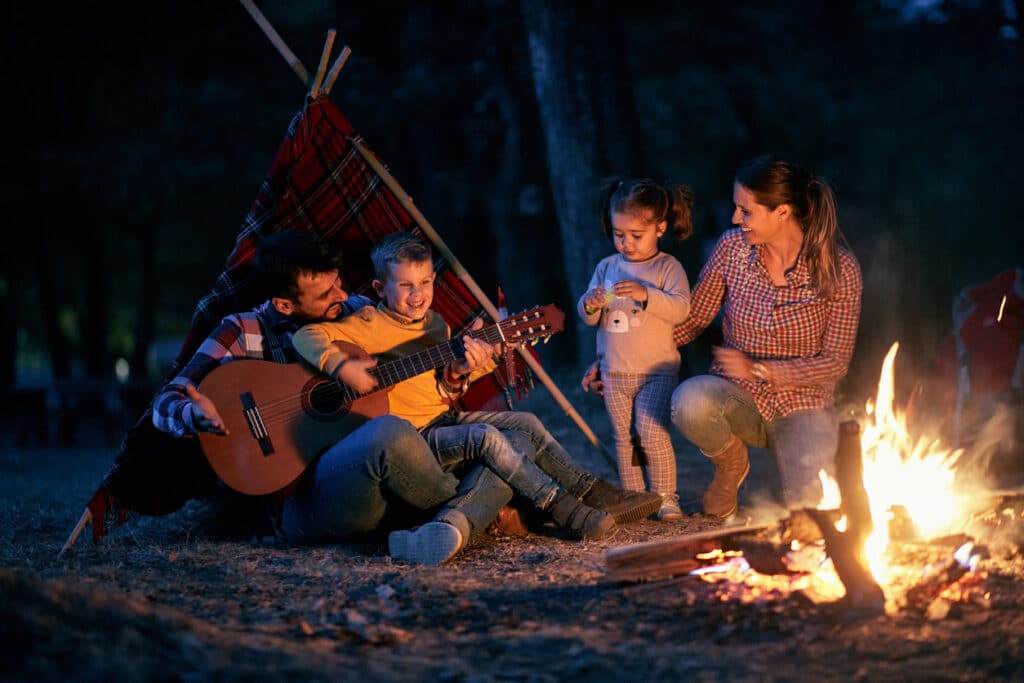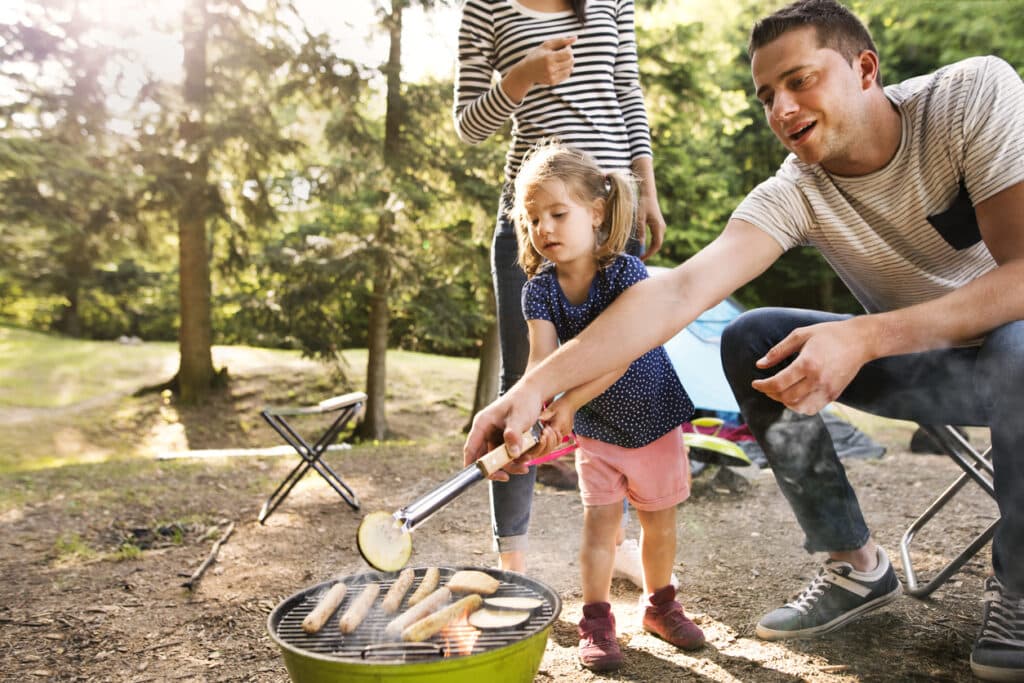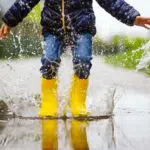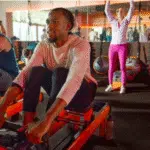

With sunny weather upon us, people are actively looking to explore different outdoor activities, with camping becoming increasingly popular amongst them. However, considering the available options for tents, sleeping bags, and other camping essentials, choosing the right gear for a camping trip can be overwhelming. We got some advice from the BBB to help you purchase the camping gear that best suits your personal needs.
Choose a tent for your needs
When choosing the right tent, you should keep three primary considerations in mind: size, weight, and seasonality. If you’re car camping and weight is not an issue, go big. Tents are often listed by the number of people they will sleep. Even though a tent can sleep six, it doesn’t mean you will be comfortable. Instead, consider getting a tent much bigger than what you need. This will give you plenty of space to move around and lots of room for kids, pets, and gear.
On the other hand, if tent weight is an issue, plan on getting a backpacking-specific tent, which will give you enough room to sleep with minimal weight. For serious thru-hikers, non-freestanding tents with guylines are a good ultra-lightweight option, though they may be a bit more challenging to set up.
Tent seasonality is determined by what kind of weather a tent can endure, so you’ll need to consider weather conditions where you plan to camp. Three-season tents are designed for relatively temperate conditions during spring, summer, and fall. They usually have plenty of mesh panels to give the tent good airflow and shield you from bugs. They also protect campers from rain. Three to four-season tents (or 3+ seasons) are a little sturdier with fewer or smaller mesh panels. They can be used in the summertime but are also a good choice for early spring or late fall when you might experience snow. Finally, 4-season tents are designed to protect campers in harsher conditions and can withstand substantial snow and wind. These tents can be used all year round but may be hot and stuffy in the summer heat.
Get a comfortable sleeping bag
When choosing a sleeping bag, be sure to consider temperature ratings, size and shape, and materials. Temperature ratings can vary pretty widely from one manufacturer to another, but, generally speaking, winter sleeping bags are rated for below -15°C, 3-season sleeping bags can range from -15°C to -1°C, and summer sleeping bags are rated for 0°C and up. You can also look at the bag’s EN (European Norm) ratings. This indicates the lowest temperature in which you’ll want to use the bag. Women’s bags use the rating “T-Comfort,” and men’s use “T-Limit.” Be warned that temperature ratings aren’t an exact science; much will depend on your personal tolerance.
If you are purchasing a bag at a brick-and-mortar store, hop in and give the bag you are considering a try. You’ll want to ensure your feet don’t ram the bottom of the bag. This will compress the insulation and reduce its effectiveness, giving you cold feet at night. In addition, you’ll need to choose between mummy style or square sleeping bags. Mummy bags taper down towards the feet and fit snugly, maximizing thermal efficiency. They are generally more compressible, too, making them ideal for backpacking. Square sleeping bags aren’t as good at heat retention, but they give you a little extra room to roll around in. Square bags are better suited for summer weather and car camping.
Sleeping bags are generally made with either down or synthetic materials. Down sleeping bags have a much better warmth-to-weight ratio, but they aren’t suitable for moist climates. They quickly lose their insulating properties when wet. Down bags have fill power ratings of 600 to 900. The higher the number, the warmer the bag. Synthetic bags are much better at retaining warmth in humid or moist climates, and they dry quickly, but they are much heavier and bulkier, making them tougher to tote on multi-day backpacking trips. A couple of drawbacks to synthetic bags are that they don’t last as long as down bags and tend to lose their insulating power if compressed for a long period of time. That said, they are usually much cheaper than down sleeping bags.
Select your camp cookware

A basic camp kitchen includes a stove, a cooler, pots, plates, cups, and utensils. A two-burner propane camp stove will let you cook your breakfast of choice while you boil water for your coffee. It’s a good idea to bring a couple of extra propane canisters to last the duration of your trip. You’ll also need a lighter to get the fire burning.
Choose a cooler with enough room for perishable foods and drinks you want to keep cool and fill it with enough ice to keep everything cold. As for pots and utensils, bring everything you’ll need for food preparation and consumption. You can buy camping-specific utensils or bring them from home; just make sure whatever you bring is durable enough to withstand the trip and camp use. If you are staying a few days, bring a couple of wash tubs, biodegradable dish soap, a scrubber, and a drying towel to take care of the dirty dishes.
Don’t forget other camping essentials
Packing for a camping trip can be challenging; you can’t easily run to the corner store if you forget something. Be sure you bring your toiletries. Even if you aren’t camping at a primitive site, you’ll need soap, shampoo, towels, and, in some cases, toilet paper. Other supplies that might come in handy are a first aid kit, sunscreen and bug repellent, and hand sanitizer.
Other gear you’ll need for your trip includes lighting, such as flashlights, headlamps, electric lanterns, camp chairs (mesh chairs dry quickly if you expect rain or dew), and a folding table if your campsite doesn’t have a picnic table. Many campers invest in a tent footprint, a custom-fitted ground cloth that protects your tent floor from damage and moisture and sleeping pads, to go under your sleeping bag and provide added comfort and warmth. A Swiss Army knife or another multitool often comes in handy, too. A broom, dustpan, and indoor/outdoor mats aren’t necessarily essential, but they can help you clean your tent during multi-day camping trips.
When making a purchase, BBB recommends you keep these tips in mind.
- Buy from trustworthy places and check business ratings before you make a purchase. Ensure you’re purchasing from trustworthy and ethical businesses. It is always a good idea to start your research by visiting BBB.org to find camping equipment near you. There you’ll find verified customer reviews and business ratings. Watch for the BBB Seal, the sign of a better business, on a business profile at bbb.org or the company website.
- Research where you are going. For a better camping experience, visit bbb.org to check out campground ratings.
- Be careful when buying online. Buying camping gear online is convenient, however, please do ensure you are buying from a reputable online seller. Carefully read customer reviews, gear descriptions, and return policies before clicking “buy.” In addition, it’s always best practice to make online purchases with your credit card, just in case you need to dispute charges later on. Read more tips for smart online shopping.
- Keep purchase receipts and product warranties in a safe place. You may want or need to return a product or ask for an exchange or repair if you encounter a problem with your purchase. Therefore, always keep your product receipt and warranty documentation in a safe place.
About BBB:
The Better Business Bureau has empowered people to find businesses, brands and charities they can trust for over 110 years. In 2021, people turned to BBB more than 200 million times for BBB Business Profiles on 6.3 million businesses and Charity Reports on 25,000 charities, free at BBB.org. Local, independent BBBs can be found across the United States, Canada, and Mexico, including BBB Serving Mainland British Columbia, which was founded in 1939 and serves Mainland BC and the Yukon territory.
Related Stories

Back-to-School Countdown: 10 Fun Can’t-Miss Events and Activities Before Summer
Whether you're looking to create lasting memories or simply make the most of the remaining vacation days, we've put together a list of some can't-miss events and activities before summer ends for you.

Sunkissed and Smiling: Top 10 Summer Activities to check out
Whether you're at home or venturing out, here are the top summer activities that will have your whole crew feeling sun-kissed and smiling.







